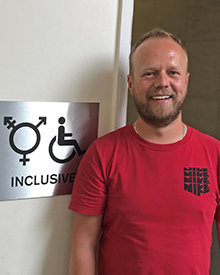Jonathan Wolf Mueller

I am a Lecturer in Endocrine Biochemistry at the Institute of Metabolism and Systems Research. In 2020, I joined the University of Birmingham; previously I worked in Germany and in London. My research and teaching focusses on biochemical regulation mechanisms of the endocrine system; focusing mainly on sexual hormones.
I have been involved in various activities to support the University’s LGBTQ community. Among these, I have participated in discussions about the LGBTQ Inclusivity in Higher Education Project. There are certainly other ways of discussing LGBTQ issues with our students, than merely when discussing retroviral infections. In this regard, I welcome the UoB LGBTQ profiles as a step forward. Further, I am a mentor for LGBTQ students, as part of the Careers Network Mentoring Scheme. I enjoy supporting students to develop and usually I’m very proud about their achievements.
During my career, I have always been open about being gay. However, I do know too well that coming out to new people can be a big thing. It might get easier once one finds ways to speak more factually and somewhat nicely wrapped about your sexual orientation. One such way could be a long-term relationship, as in “My husband and I have done…” Another way could be participating in the Careers Network Mentoring or similar official schemes. There also is the oSTEM initiative, which stands for out-in-STEM. I felt honoured to be invited to give presentations in two oSTEM events already.
Generally, I would say that the University of Birmingham is an LGBTQ friendly organisation. Over recent years, I think we have made big steps towards creating a truly inclusive environment: events taking place during LGBT History Month, the LGBTQ Mentoring Scheme, the LGBTQ Inclusivity in Higher Education Project, and the LGBTQ Allies Scheme are some examples.
I hope that the University will continue to support all these initiatives. There is awareness, visibility, and policies to support the LGBTQ community, but there is still a lot to be done. Studies have shown that LGBTQ students have higher chances of having mental health problems and increased drop out-rates of university. So, there are important issues that we need to work on in the future. In the meantime, a very warm welcome to our new LGBTQ students and staff at our University.